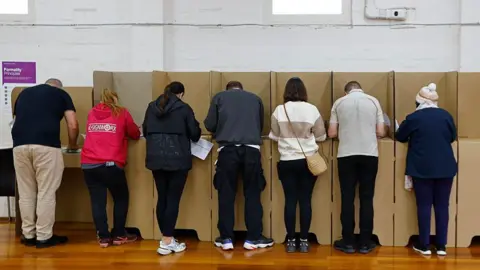How compulsory voting works in Australia
Australians will head to the polls tomorrow to elect a new government.
But the country's 18 million eligible voters won't just be going to pick their preferred candidate - they'll also be fulfilling a legal obligation.
Since 1924, voting has been compulsory for all Australian citizens over the age of 18, with failure to vote carrying a fine of A$20 ($13; £10).
Today, while many countries are struggling to get people to the ballot box, Australia boasts one of the highest voter turnouts in the world.
The country's last federal election in 2022 saw ballots counted from around 90% of eligible voters, according to official statistics.
For comparison, the voter turnout for the UK general election in 2024 was 60%, while the figure for the US presidential election in the same year was 64%.
Compulsory voting has broad popular support in Australia, and is seen as a way to capture representation from the majority of society - not just the majority of people who choose to vote.
Here's what you need to know about compulsory voting in Australia.
What does Australia do to make people vote?
You can be exempted from voting with a valid reason, but Australian authorities have put in place a variety of policies to reduce barriers to voting. For one, elections are held on Saturdays, when more workers will be free to go down to polling stations.
Employers are also required to give workers paid leave on election day to ensure that people have enough time to go vote.
An added incentive for people to perform their democratic duty are "democracy sausages", grilled on barbeques near polling booths. These snacks have become icons of Australian elections, often making them the largest fundraising events of the year for local schools and community groups.
 Getty Images
Getty ImagesWhat are the benefits of compulsory voting?
Voting became compulsory for federal elections when the Electoral Act was amended in 1924, and the effect was swift and stark: voter turnout surged from less than 60% in the 1922 election to more than 91% in 1925.
A big argument for compulsory voting in Australia is the legitimacy it grants the election winner.
"Proponents of compulsory voting argue that a parliament elected by a compulsory vote more accurately reflects the will of the electorate," reads a guide published by the Australian Election Commission.
"Compulsory voting is claimed to encourage policies which collectively address the full spectrum of elector values," said the commission. On the flipside, it notes, compulsory voting also runs the risk of "pork barrelling" - the use of government funds for projects that will curry favour with voters - as parties focus on winning over voters on the margins.
While there is no scientific consensus on how compulsory voting affects the policy issues championed by political parties, many believe it counters political polarisation by drawing out more moderate voters.
Conversely, places without compulsory voting may see parties appealing to more extreme voter bases.
"That means they can be tempted towards much more extreme political issues," historian Judith Brett told the BBC in 2022, when the last Australian federal election was held. "Whereas because everybody has to vote, in a way it pulls politics towards the centre."
Compulsory voting also helps ensure that marginalised people are better represented, said Ms Brett. Research shows that people who are less affluent are also less likely to vote.
"Now that means that politicians, when they're touting for votes, know that all of the groups, including the poor, are going to have a vote," Brett said. "And I think that makes for a more egalitarian public policy."
What do Australians think of it?
Compulsory voting is fairly uncontroversial in Australia.
National surveys since 1967 show public support for the laws have consistently hovered around 70%.
Over the decades there have been individuals campaigning to end compulsory voting, arguing that citizens should have the right to choose whether to vote at all - but such calls have gained little traction among the wider population.
In 2022, 77% of Australians said they would have still voted if it was voluntary.
